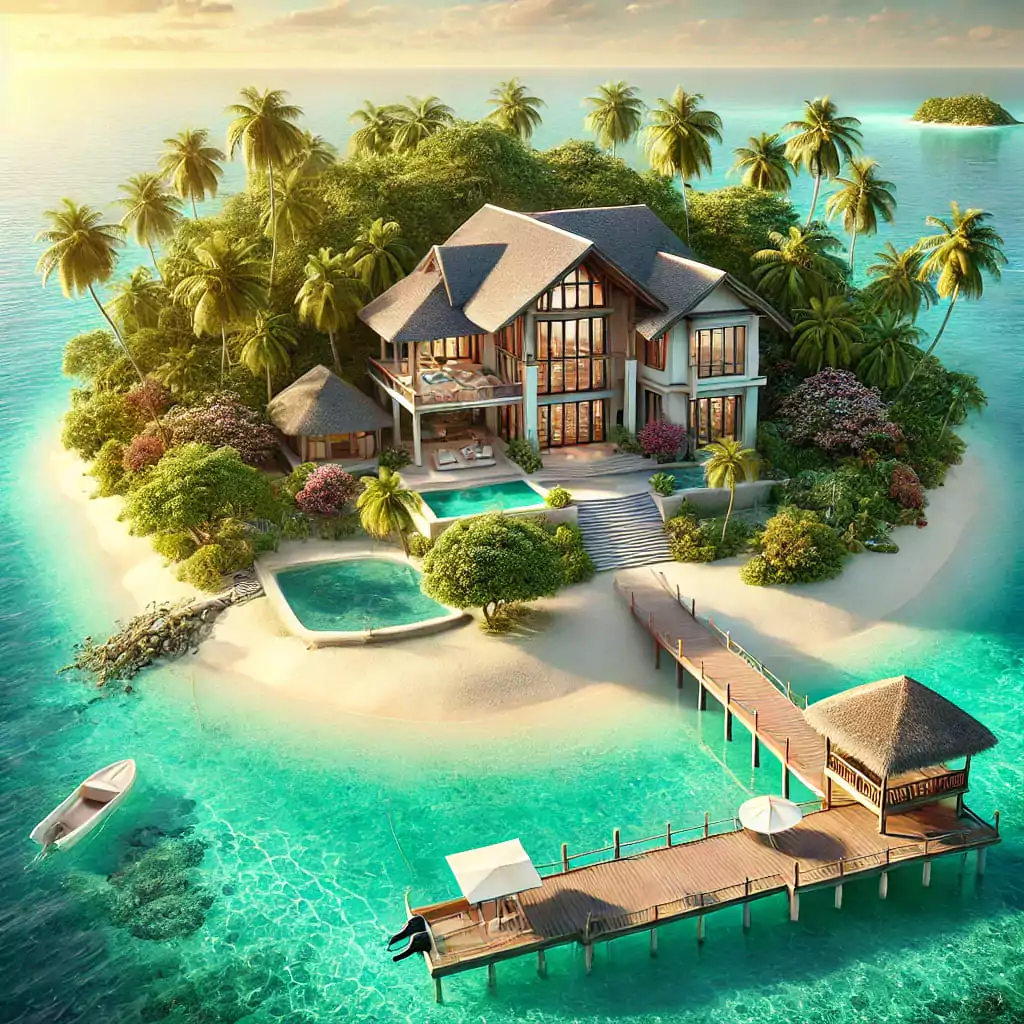Picture this: waking up to the sound of waves gently lapping against your private shoreline. No noisy neighbors blasting their music at 2 a.m., no lingering smell of burnt toast from the apartment next door, and no fighting for a parking spot. Your commute? A gentle paddle across crystal-clear waters—if you even need to leave.
Sounds dreamy, right? But what if this wasn’t just a vacation fantasy? What if everyone on Earth swapped their homes for their very own island? Could it work, or would it be, as my grandma might say, “a recipe for disaster?” Let’s dive into this salty slice of paradise and find out.
Table of Contents
The Fantasy: Personal Islands for All
Imagine a world where your address isn’t “123 Main Street” but simply “My Island.” Instead of rows of cookie-cutter houses, you’d have your own little paradise—a cozy beach hut, a hammock swaying under a palm tree, and maybe a pet goat or a surfboard (because why not?).
Transportation? Forget cars. You’d get around via boats, jet skis, or even futuristic drone-taxis. Privacy is a given. You wouldn’t need to deal with HOA rules, loud parties next door, or that one neighbor who always asks to borrow your tools and never returns them.
At first glance, it sounds like a dream come true. But as anyone who’s ever planned a family vacation knows, even paradise comes with complications.
Why Islands Could Be Amazing
1. Privacy: An Introvert’s Fantasy
The number-one perk? No neighbors to deal with. Want to blast your favorite guilty-pleasure playlist while wearing your pajamas all day? Go for it. Dream of hosting a beach party that ends with everyone building life-sized sandcastles? The island is your oyster.
For introverts, it’s the ultimate fantasy: no doorbells, no small talk, just peace and quiet.
2. The Ultimate DIY Challenge
Living on an island forces you to become self-sufficient. Grocery stores and hardware shops wouldn’t exactly be around the corner. You’d need to grow your own food, collect rainwater, and maybe even generate electricity. Call it the ultimate crash course in DIY survival. For anyone who’s ever binge-watched survival shows like Alone or Cast Away, this could be the challenge of a lifetime.
3. Cities Get a Breather
Cities like New York, Tokyo, and Mumbai are bursting at the seams. Personal islands could ease overcrowding, giving urban centers room to breathe. Public transport? Forget the subway—you’d have the sea as your personal highway.
4. Nature at Its Best
Studies in Frontiers in Psychology show that spending time in nature reduces stress and boosts creativity. With constant ocean views, fresh air, and maybe the occasional dolphin sighting, island living would offer nature therapy 24/7. It’s hard to be grumpy when your backyard is an endless blue horizon.
But Wait, What’s the Catch?
1. Loneliness: Paradise Gets Quiet
Living alone on an island might sound peaceful, but solitude can get tricky. Humans are social creatures—we need connection, even if it’s just someone to argue with about whose turn it is to wash the dishes. Too much alone time could lead to modern-day Wilson moments (you know, like Tom Hanks talking to a volleyball in Cast Away).
2. Logistics Are a Nightmare
Clean water, electricity, internet—none of these essentials come easy when you’re living on a patch of land in the middle of the ocean. While solar panels and wind turbines might cover some needs, scaling these solutions for billions of islands would be an engineering feat. And don’t even get me started on undersea internet cables for everyone’s TikTok habits.
3. Environmental Woes
Building billions of islands would wreak havoc on marine ecosystems. According to Nature Climate Change, human expansion already threatens 13% of marine habitats. Turning every person into an island owner could obliterate mangroves, coral reefs, and other critical environments. Floating, eco-friendly islands might help, but the environmental challenges are staggering.
4. Inequality on the High Seas
Not all islands would be created equal. Some might be lush and resource-rich, while others would be barren rocks in the middle of nowhere. Inequality wouldn’t disappear; it’d just take on a tropical twist. Your wealth might still determine whether you get a fertile paradise or a glorified sandbar.
How Life Might Actually Work
1. Community 2.0
Instead of neighborhoods, we’d have island clusters connected by floating bridges or communal docks. Think of a mix between Venice and Moana. Floating markets might pop up where people could trade supplies, share resources, or just hang out. You’d probably see signs like, “Fresh fish for trade—chocolate preferred!”
2. Remote Work Becomes the Norm
The shift to remote work would hit an all-time high. Offices, schools, and even healthcare could move online, with VR and holograms handling most interactions. Need groceries? A drone might deliver them. Need to see a doctor? Telemedicine would have you covered.
For physical jobs, like farming or manufacturing, communal hubs might act as shared workspaces. Imagine a farmer’s market floating in the middle of the ocean—it’s a vibe.
3. Micro-Governments Rule the Waves
With billions of islands, large centralized governments might not work. Instead, we’d likely see hyper-local councils managing individual islands or small clusters. A “League of Islands” could oversee trade, environmental policies, and global cooperation—picture diplomats hashing out treaties over floating conference tables.
Psychological Perks (and Pitfalls)
1. A Sense of Ownership
Owning your island means complete freedom. Paint your house bright purple, turn your yard into a trampoline park, or build a tiki bar for your pet goat—no one’s stopping you. This level of autonomy could foster creativity and self-confidence, making people happier in the long run.
2. Relationships Would Change
Spontaneous hangouts might disappear. Visiting friends would require planning, and socializing could become more meaningful—or just plain awkward. Imagine getting a message that says, “Haven’t paddled over in weeks—are we still friends?”
3. Nature as a Constant Companion
Living surrounded by nature would have huge mental health benefits. Studies consistently show that time spent outdoors reduces anxiety and improves focus. With the ocean as your backyard, brainstorming big ideas might become a daily habit.
Can Technology Make It Work?
For this dream to work, technology would have to step up big time:
- Renewable Energy: Solar panels, wind turbines, and wave energy converters could power islands sustainably.
- Smart Homes: AI could automate chores like watering plants, monitoring energy use, or managing waste.
- Transportation: Autonomous boats or flying drones could make hopping between islands quick and efficient. Forget Uber—call a water taxi.
A Word About Sustainability
This scenario only works if it’s eco-friendly. Floating islands made from recycled materials could preserve marine habitats, while strict conservation zones would protect biodiversity. A circular economy—where waste gets recycled into resources—would be essential to keep paradise intact.
The Verdict: Utopia or Chaos?
So, would a world of personal islands be heaven or a sun-soaked disaster? Probably a little bit of both. While the privacy, connection to nature, and freedom sound incredible, the logistical and environmental challenges would be monumental.
At its core, this idea isn’t just about islands. It’s a way to rethink how we live, work, and connect with each other and the planet. What if we could have more space and freedom without losing community? What if we could live sustainably while dreaming big?
Whether or not this vision becomes reality, it’s worth considering how to create a better balance in our current lives. And if it does happen someday? Save me a spot—I’ll be the one with the hammock, a pineapple farm, and a very spoiled pet goat.




